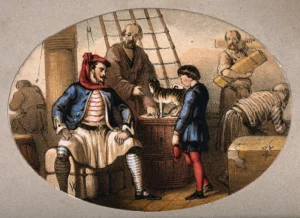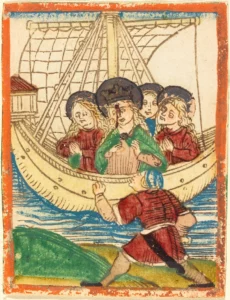It’s interesting how so often, fictional characters from Rye are better known than real people. Mapp and Lucia, the rival queens of Tilling, are synonymous with Rye. Rye was a notorious pirate port from the 13th century, yet its perhaps most famous pirate is John Ryan’s Captain Pugwash, first created for the Eagle comic in 1950, with the first Pugwash booked published in 1957 and a television version produced in the same year.
The neighbouring hill town of Winchelsea had an equally bad reputation for piracy, with even its leading families involved. Indeed, the Winchelsea pirates were regarded as the most savage in Europe.
Our local pirates often attacked foreign ships, but certainly weren’t averse to dealing with English vessels if the opportunity showed itself – and not just vessels, as a document in the National Archives tells us. Some time about 1330, King Edward III’s ‘Liege people of Southampton’ petitioned the king, to complain about a former royal admiral and Baron of the Cinque Ports from Winchelsea, Robert Batail. Together with ‘many other men,’ of the Cinque Ports Federation, he had, late in 1321, attacked Southampton. They were helped by a man called Hugh Despenser the Younger, the first Baron Despenser, who had been a particular favourite of King Edward II. By 1321, having been sent out of England after Edward was deposed, he was working as a pirate. He joined the raid because he believed that the citizens of Southampton had supported his enemy, the Earl of Lancaster.
The attack took place between Wednesday 30 September and Thursday 1 October, or, as the petition says, ‘le merkedy et le joeuedy p’scheins ap’s le seint Michel.’ The petition says that Batail and his crew burnt ships in harbour, together with their cargoes. In addition, they stole anything else they could lay their hands on, including ships, all worth £8,000. That’s nearly £6 million now.
The Chronicles of St. Paul, probably written by one of the canons of St. Paul’s Cathedral in London, written between 1307-41, is one of the best accounts of the reign of King Edward II. It tells us that the raiders from Winchelsea were, ‘kindled by the fuel of envy,’ attacked in 30 ships and ‘maliciously burnt’ 15 ships in the harbour.

How had Edward II dealt with this attack? Had he punished the raiders? No, he imprisoned ‘the community of Southampton,’ so its leaders, in Portchester Castle and, after promising compensation for their losses, forced them not to take action against the Winchelsea raiders. So, what compensations did he give them? According to the Chronicles of St. Paul, ‘des queux rien nest fait.’ Nothing. The petition to Edward III asked for ‘aid and remedy,’ particularly as the wife of Edward II, Isabella of France, who led the revolt against her husband, and who was known as Isabella the She-Wolf, controlled Southampton, or as the petitioners said, it was, ‘in the hand of my lady the queen.’
What, you may well ask, happened to Robert Batail (or Bataill, Bataille, Batayle – spelling was flexible) after taking part in such a piece of deliberate savagery? On May 13 1322, he was made ‘captain and admiral of the ships of the Cinque Ports about to go against the Scots,’ whilst just under a year later, on April 18 1323, he was promoted to admiral of the western fleet. On top of that, on May 6 1322, Batail, together with Robert Alard, from the prominent Winchelsea family, received a royal pardon in respect of ‘all offences committed on land or sea.’ Who said that crime doesn’t pay?
Pirates from the Cinque Ports were known as Portsmen, or even the King’s Pirates, because the reigning monarch was known for taking for himself 20% of whatever they took. They also acted for the king in times of war. No one seems to have thought amiss of the piratical deeds. Just look at the Alards of Winchelsea. The mayor who was a pirate. Stephen Alard was a pirate and a royal admiral. Gervase Alard, a well- known pirate. No punishments, just honours and wealth accruing to them, at their magnificent house, Firebrand in Winchelsea. Even the strongest of the Plantagenet kings, Edward I, had no power to stop them. Robert Batail, when no longer able to take part in raids, became mayor of Winchelsea.
Their power seems to have stemmed from their loyalty to the crown, and any attempt to stop their nefarious actions was followed by a threat to change that loyalty. In 1299, they said, ‘Let the King’s Council be well assured that if any wrong or grievance be done to them in any way against justice, they will forthwith forsake their wives and children and all they possess and go make their profit upon the sea wheresoever they think they will be able to acquire it.’ So, that profit could be made by attacking royal ships or by siding with the traditional enemy, the king of France, as mercenaries.
The Lord Warden of the Cinque Ports did try to hold the Portsmen to account when merchants from Gascony lost cargoes worth £11,200 – about £10 million now. He had arrested suspects from Winchelsea, Rye and Romney but nothing came of it because local officials actually prevented him from doing anything by force. Local mayors and magistrates, when ordered to find who was responsible for a raid on a Flemish ship said that prosecuting them wasn’t their job. They were then ordered to take the men to trial in London and refused. They were arrested by the Constable of Dover Castle, but nothing else happened – except that Flemish ships were hence force banned from English waters.

Retribution was rare, but it did occasionally happen. In 1348, a merchant from the Yorkshire port of Bridlington brought a prosecution against some men from Winchelsea. Not only did the mayor of Winchelsea get his stolen property back to him, but the offenders were hanged. I wonder what happened to the mayor as a result? What it did, however, indicate, was that piratical power was waning. Maybe the violence was just becoming too much to countenance.
It’s hard to imagine now, but the mediaeval Winchelsea pirates were believed to be the worst criminals in the whole of Europe. Their casual cruelty was legendary. They thought nothing of tossing their victims into the sea to drown. To be fair, this was fairly standard behaviour, even when fighting a naval battle, but the Winchelsea reputation was especially bad. It was said of them that they could kill other sailors, ‘quicker than it takes to eat a biscuit.’ Anyone who was carrying documentation that was supposed to guarantee safe conduct soon found out just how much that guarantee meant!
The very worst atrocity seems to have been in 1290. Then, deteriorating relations between Christians and Jews led to the Edict of Expulsion, ordered by King Edward I on July 18 of that year. This came about because parliament refused to raise taxes for war with France unless the expulsion was ordered. They were given until November 1 to leave; after that date they would be arrested and executed. Their houses were taken by the crown, but portable chattels were allowed to be taken. The king ordered his county sheriffs to ensure their safety when leaving England. Whilst this happened for many, Walter of Guisborough wrote of one shipful who had the misfortune to be attacked by Winchelsea pirates. They persuaded them that a stroll on an exposed Channel sandbank would be a good idea, only to leave them there when the tide covered it. The pirates were hanged for this terrible action.
Image Credits: pixabay https://www.stockvault.net/photo/195129/zlib/common cc https://creativecommons.org/publicdomain/zero/1.0/, rawpixel http://CC https://creativecommons.org/publicdomain/zero/1.0/, rawpixel.com / National Gallery of Art https://www.rawpixel.com/search/medieval%20ship%20illustration?page=1&path=_topics&sort=new CC https://creativecommons.org/publicdomain/zero/1.0/.



